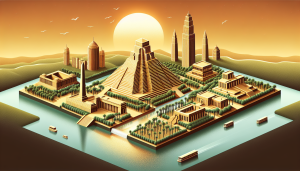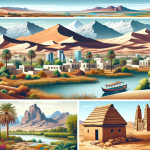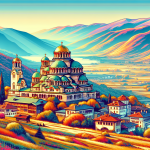Discovering Iraq: A Journey Through History, Culture, and Natural Beauty
Iraq, often referred to as the “Cradle of Civilization,” is a country that boasts a rich tapestry of history, culture, and natural beauty. Despite its recent struggles, Iraq remains a fascinating destination for travelers eager to explore its ancient ruins, vibrant cities, and diverse landscapes. This article will take you on a journey through Iraq, highlighting its historical significance, cultural heritage, and various attractions that make it a unique and compelling destination. From the ancient city of Babylon to the bustling streets of Baghdad, Iraq offers a wealth of experiences for those willing to venture off the beaten path. By the end of this article, you will have a deeper understanding of Iraq’s historical importance, cultural richness, and the many reasons why it should be on every traveler’s bucket list.
The Historical Significance of Iraq
Iraq’s historical significance cannot be overstated. As the birthplace of some of the world’s earliest civilizations, including the Sumerians, Akkadians, Babylonians, and Assyrians, Iraq has played a pivotal role in shaping human history. The ancient city of Ur, located in southern Iraq, is one of the oldest known cities in the world and is believed to be the birthplace of the biblical patriarch Abraham. The city of Babylon, with its famous Hanging Gardens, was one of the Seven Wonders of the Ancient World and served as the capital of the Babylonian Empire. The Assyrian city of Nineveh, located near modern-day Mosul, was once the largest city in the world and a center of political and economic power in the ancient Near East.
These ancient cities, along with countless other archaeological sites scattered throughout the country, offer a glimpse into Iraq’s storied past and provide invaluable insights into the development of human civilization. For history enthusiasts, a visit to Iraq is like stepping back in time and witnessing the rise and fall of some of history’s greatest empires.
Exploring Iraq’s Cultural Heritage
Baghdad: The Heart of Iraq
Baghdad, the capital of Iraq, has long been a center of cultural and intellectual activity. Founded in the 8th century by the Abbasid Caliphate, Baghdad quickly became one of the most important cities in the Islamic world, known for its libraries, universities, and bustling markets. Today, despite the challenges it has faced, Baghdad remains a vibrant city with a rich cultural heritage. Visitors can explore the National Museum of Iraq, which houses an extensive collection of artifacts from Iraq’s ancient civilizations, including the famous treasures of Nimrud. The Al-Mutanabbi Street, known as the heart of Baghdad’s literary culture, is a must-visit for book lovers, with its numerous bookstores and cafes.
The City of Erbil
Erbil, the capital of the Kurdistan Region in northern Iraq, is one of the oldest continuously inhabited cities in the world. The city’s ancient citadel, which dates back to at least the 5th millennium BC, is a UNESCO World Heritage Site and a testament to Erbil’s long and storied history. The citadel offers stunning views of the city and is home to several museums and cultural institutions, including the Kurdish Textile Museum and the Erbil Civilization Museum. Erbil is also known for its lively bazaars, where visitors can shop for traditional Kurdish handicrafts, spices, and other local products.
Discovering Iraq’s Natural Beauty
The Mesopotamian Marshes
The Mesopotamian Marshes, located in southern Iraq, are one of the most unique and biodiverse ecosystems in the world. Often referred to as the “Venice of the Middle East,” the marshes are home to a variety of plant and animal species, many of which are found nowhere else on earth. The marshes have been inhabited for thousands of years by the Marsh Arabs, who have developed a unique way of life adapted to the watery environment. Visitors to the Mesopotamian Marshes can take boat tours to explore the intricate network of waterways, visit traditional reed houses, and learn about the culture and history of the Marsh Arab communities.
The Zagros Mountains
The Zagros Mountains, which stretch across the western part of Iraq, offer stunning landscapes and a range of outdoor activities for nature lovers. The mountains are home to several national parks and protected areas, including the Rawanduz Gorge, a popular destination for hiking, rock climbing, and bird watching. The region is also known for its picturesque villages, where visitors can experience traditional Kurdish hospitality and enjoy local cuisine. The Zagros Mountains provide a perfect escape from the hustle and bustle of city life and offer a chance to immerse oneself in Iraq’s natural beauty.
Practical Tips for Traveling in Iraq
Traveling in Iraq requires careful planning and consideration of safety and security concerns. It is essential to stay informed about the current situation and follow the advice of local authorities and travel advisories. Here are some practical tips for traveling in Iraq:
– **Research and plan your trip thoroughly**: Before traveling to Iraq, make sure to research the areas you plan to visit and be aware of any potential risks. It is also a good idea to have a detailed itinerary and make arrangements with local guides or tour operators who are familiar with the region.
– **Stay informed about safety and security**: Keep up to date with the latest news and travel advisories from reliable sources, such as the U.S. Department of State or your country’s embassy in Iraq. Be aware of any areas that are considered unsafe for travel and avoid them.
– **Respect local customs and traditions**: Iraq is a country with a rich cultural heritage and diverse traditions. Be respectful of local customs and dress modestly, especially when visiting religious or cultural sites. It is also important to be mindful of local etiquette and avoid any behavior that may be considered disrespectful.
– **Stay connected and communicate**: Make sure to have a reliable means of communication, such as a local SIM card or an international phone plan, to stay in touch with family and friends. It is also a good idea to register with your embassy or consulate and provide them with your travel details.
Conclusion: Embracing the Spirit of Adventure in Iraq
Despite the challenges it has faced, Iraq remains a country of immense historical, cultural, and natural significance. For travelers with a sense of adventure and a passion for history and culture, Iraq offers a wealth of experiences and opportunities to explore its rich heritage and breathtaking landscapes. From the ancient ruins of Babylon and the vibrant streets of Baghdad to the serene beauty of the Mesopotamian Marshes and the rugged peaks of the Zagros Mountains, Iraq is a destination that promises to leave a lasting impression on those who visit. By embracing the spirit of adventure and approaching the journey with an open mind and a respectful attitude, travelers can discover the true essence of Iraq and gain a deeper appreciation for its unique place in the world.
For more information on traveling in Iraq and other unique destinations, visit Lonely Planet’s Iraq Travel Guide.








